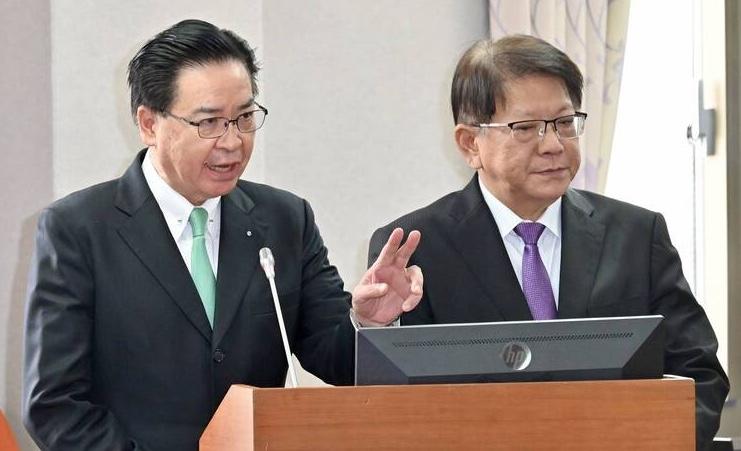Recently passed amendments to fiscal planning law could reduce the defense budget by 28 percent, undermining Taiwan’s military readiness and international support, National Security Council (NSC) Secretary-General Joseph Wu (吳釗燮) said today.
Wu, Presidential Office Secretary-General Pan Men-an (潘孟安) and Academia Sinica researcher Chen Yi-shen (陳儀深) were among those who spoke at a meeting of the Legislative Yuan’s Judiciary and Organic Laws and Statutes Committee to give remarks on the budget.
The amended Act Governing the Allocation of Government Revenues and Expenditures (財政收支劃分法), if promulgated, would result in a NT$375.3 billion (US$11.47 billion) reduction of the central government’s budget, Directorate-General of Budget, Accounting and Statistics said.

Photo: George Tsorng, Taipei Times
Other countries in the first island chain have increased their defense spending, such as South Korea increasing its budget by 4.5 percent and Japan by 16 percent, Wu said.
However, Taiwan, the nation under the most pressure, may see its budget reduced by 30 percent, he added.
This would affect military readiness and the maintenance of equipment, he said.
As other countries evaluate Taiwan’s resolve to defend itself based on the defense budget, cutting it by 30 percent would send the wrong message, suggesting that it has no intention of defending itself, he said.
In that case, no like-minded countries would help Taiwan, Wu added.
On Dec. 9, foreign media quoted high-level Taiwanese defense officials as saying that China deployed 90 vessels to the East and South China Seas surrounding Taiwan, Wu said.
These reports were confirmed, showing that China had launched large-scale naval training exercises, he added.
These recent drills show China’s ability to mobilize in adverse conditions and simultaneously threaten all nations within the first island chain, meaning that Taiwan must be careful, he said.

Civil society groups yesterday protested outside the Legislative Yuan, decrying Chinese Nationalist Party (KMT) efforts to pass three major bills that they said would seriously harm Taiwan’s democracy, and called to oust KMT caucus whip Fu Kun-chi (傅?萁). It was the second night of the three-day “Bluebird wintertime action” protests in Taipei, with organizers announcing that 8,000 people attended. Organized by Taiwan Citizen Front, the Economic Democracy Union (EDU) and a coalition of civil groups, about 6,000 people began a demonstration in front of KMT party headquarters in Taipei on Wednesday, organizers said. For the third day, the organizers asked people to assemble

POOR IMPLEMENTATION: Teachers welcomed the suspension, saying that the scheme disrupted school schedules, quality of learning and the milk market A policy to offer free milk to all school-age children nationwide is to be suspended next year due to multiple problems arising from implementation of the policy, the Executive Yuan announced yesterday. The policy was designed to increase the calcium intake of school-age children in Taiwan by drinking milk, as more than 80 percent drink less than 240ml per day. The recommended amount is 480ml. It was also implemented to help Taiwanese dairy farmers counter competition from fresh milk produced in New Zealand, which is to be imported to Taiwan tariff-free next year when the Agreement Between New Zealand and

A woman who allegedly spiked the food and drinks of an Australian man with rat poison, leaving him in intensive care, has been charged with attempted murder, the Taipei District Prosecutors’ Office said yesterday. The woman, identified by her surname Yang (楊), is accused of repeatedly poisoning Alex Shorey over the course of several months last year to prevent the Australian man from leaving Taiwan, prosecutors said in a statement. Shorey was evacuated back to Australia on May 3 last year after being admitted to intensive care in Taiwan. According to prosecutors, Yang put bromadiolone, a rodenticide that prevents blood from

A Japanese space rocket carrying a Taiwanese satellite blasted off yesterday, but was later seen spiraling downward in the distance as the company said the launch attempt had failed. It was the second attempt by the Japanese start-up Space One to become the country’s first private firm to put a satellite into orbit, after its first try in March ended in a mid-air explosion. This time, its solid-fuel Kairos rocket had been carrying five satellites, including one from the Taiwan Space Agency and others designed by Japanese students and corporate ventures. Spectators gathered near the company’s coastal Spaceport Kii launch pad in Japan’s